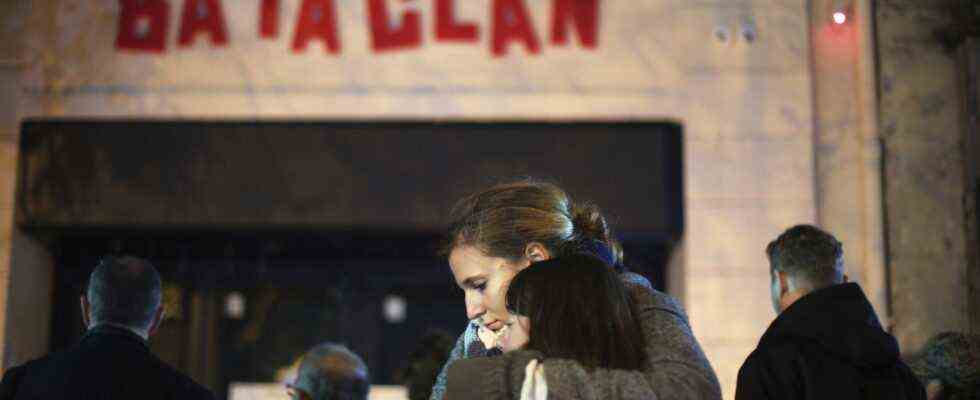Status: 08.09.2021 6:00 a.m.
As of today, the series of attacks from November 2015 will be debated before a Paris court. Terrorists killed more than 130 people in a coordinated action. What does the country expect from the “Trial of the Century”?
It was the night of November 13-14, 2015, when then President François Hollande rushed to the Bataclan music club, one of several places in Paris where terrorists had shot a total of 130 people shortly before. That night in front of the Bataclan, where 90 people died alone, he had “the horror in mind”, he now recalls in an interview with the ARD.
People came out who had seen the worst. And the rescue workers were full of horror – they saw faces disfigured by bullets, bodies entwined with motion. It is important that the public today knows what happened there. That is what the process is about.
542 investigation files, 140 days of negotiations. More than 330 lawyers. And more than 140 accredited media from almost 60 countries. Ex-President Hollande declared a state of emergency and had the borders closed. Now he will testify.
The Bataclan in Paris had been threatened repeatedly by radical Islamists even before the 2015 massacre. On November 13, 2015, they followed up their words with cruel deeds.
Image: AFP
“Democracy has the last word”
He wants to look the accused in the eyes, he says – and they should see him and know: “Democracy has the last word. Even in the face of terror, we have to hear the accused, allow them lawyers and convict them if they are guilty. “
The process also has educational value for Hollande. Future generations should understand how people let themselves be carried away to such barbaric acts. Therefore, the trial will be filmed and published, as was the case against Klaus Barbie.
The 1987 trial of the Nazi war criminal and “butcher of Lyon” was the first to be recorded for history in France. The historian Virginie Sansico researches the history of justice and the legal concept of terrorism. She classifies the process in other proceedings for particularly momentous acts in France and also refers to the film documentation – the proceedings will be carried out before the start assessed as historical.
The series of attacks from 2015
Islamist extremists attacked numerous targets in the French capital, Paris, in a coordinated action on the evening of November 13, 2015. In the Bataclan concert hall they caused a massacre during a performance by the band “” and killed 90 people. They shelled bars and restaurants in the east of the city. Suicide bombers blew themselves up at the Stade de France in Saint-Denis during the soccer friendly between Germany and France. These were the most momentous attacks in peacetime for France to date. A total of 130 people died.
No final point
Sansico reminds at the same time of the trial of the attack on the satirical newspaper “Charlie Hebdo”: This should have ended the subject – but there were new attacks during the tribunal. She is skeptical about that: “The hope of reaching an end will not be able to be fulfilled by this process, which will certainly be gigantic.”
But one has learned from the legal processing of the “Charlie Hebdo” attack – the hearings now only start at noon. Better for judges and police, who don’t have to bring the accused in the early morning hours. The trial takes place not far from Notre Dame Cathedral in the Palace of Justice. In the historic “Hall of Lost Steps” with its marble floor and high vaults, a hall was fitted for more than eight million euros: it is called “Grand procès”.
Inside, simple, light wooden benches like in a modern church. 550 people fit inside. There is a safety box for the defendants. And ten cameras for recording. Up to ten additional halls with live broadcasts are available for around 1,800 civil plaintiffs.
A simple trial room: the room built especially for the mammoth trials surrounding the 2015 attacks will host a mammoth trial.
Image: AP
Historian Sansico knows that a catharsis is often hoped for from such processes, a purification that allows the victims to turn to new things. But it doesn’t have to happen that way. That could disappoint many injured parties. Because: “A criminal trial is not there to make it easier for the victims, but to judge the accused. That is the dichotomy.”
A novelty this time: the plaintiffs can also follow the process via web radio from home with a 30-minute delay. Grégory Reibenberg does not intend to do that. The owner of the brasserie “La Belle Équipe” prefers to listen to music on the radio. Because his restaurant was one of the six crime scenes. More than 20 people died before his eyes, including the mother of his now 14-year-old daughter.
“We have to show our civilization”
The fact that there is a process is “very good,” says Reibenberg. He’s in the process Plaintiff for his daughter and wants to testify – “For the victims. That is an honor. We have to show our civilization and do justice.” And it is important to him “that the names of the victims are heard more often than those of the executioners”.
But he does not want to see the 20 defendants, 14 of them present. He wants to understand whether the perpetrators were just henchmen or sleepers. Because what one experienced that evening were not assassinations – “that was a military attack, a new form of war”. He doesn’t want to know more. That is why he only wants to follow the process at the beginning and at the end. “
To this day, restaurant manager Reibenberg closes every 13th of the month. It is a good reason for the process if even one person heals through it.

